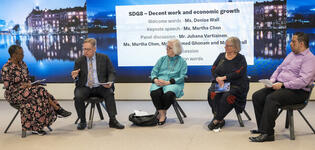Blog
UNU-WIDER’s new Massive Open Online Course (MOOC) advances progress on SDG 8: Decent Work
UNU-WIDER’s 6-week online course on delivering Sustainable Development Goal 8 (SDG 8) brings together recent research on the linkages between economic growth and decent work. Most of the evidence draws on recent UNU-WIDER publications, all of which are available to download for free. The course is designed to bridge the gap between research and policy and is tailored for development practitioners and people involved in policy processes.
The commitment to achieve the 17 SDGs was made by all UN member states in 2015. Eight years later, halfway to the 2030 deadline, the path to the goals is still long. The SDGs are a comprehensive plan of interlinked goals to address the needs of humanity and the planet. While the achievement of all goals is important, some goals are crucial to achieving other goals. One such goal is SDG 8: Decent work and economic growth. SDG 8 addresses the crucial role of economic growth, employment, and decent work in achieving sustainable development.
Everyone deserves decent work
One challenge to achieving SDG 8 is what to think and do about informal employment. The International Labour Organization (ILO) estimates that 2 billion people, or over 60% of the work force globally, are informally employed. Most informal workers lack access to the four pillars of the ILO Decent Work Agenda: opportunities, rights, social protection, and voice.
By definition, informal workers lack legal recognition. Most lack access to public goods, including public space, to pursue their livelihoods. Moreover, informal workers are subject to prejudice. To promote decent work for all requires addressing the negative narratives and the biased policies and laws faced by informal workers.
Recent research by UNU-WIDER and others documents the heterogeneity of the informal economy and the needs and constraints faced by different groups of informal workers. A recent UNU-WIDER volume presents a ‘job ladder’ framework built on extensive empirical evidence which helps to unpack the different tiers of formal and informal work found in Global South countries, including the skill levels of workers, their motivations to work informally, and the barriers to transitioning to formal work. Our growing understanding of informal work provides important lessons for more appropriate and inclusive policy responses to the informal economy.
If the global community truly wants to achieve decent work for all, we need real reforms to promote the transition of informal workers to formal employment and to recognize, protect, and support informal workers and their livelihoods.
Rethinking structures
Decent work also requires solid strategies for economic growth. No country that we know of, starting from the industrial revolution, has achieved sufficient levels of economic growth without undergoing a structural transformation. In the early years of development economics, structural transformation was understood through the lens of the experience of rich countries and a few middle-income countries. It was assumed that, as countries get richer, workers would move from agriculture to manufacturing and then to services and from informal to formal employment.
This theory is still prominent in development economics, but does it reflect contemporary reality? New data, methods and analysis reveal different patterns of structural transformation, notably a shift from agriculture directly into services and the persistence of informal employment. Yet current economic policies do not reflect these realities. Focusing on moving workers from agriculture to manufacturing, and then services, and from informal to formal employment may no longer be appropriate for all countries.
The processes and patterns of structural transformation affect not only the structure of the economy, but also the jobs available—they impact who benefits from development and who gets left behind. This is what is meant by the ‘developer’s dilemma’: namely, the concern that economic development almost inevitably leads to increased inequality. But new research indicates that appropriate policy interventions can protect against rising inequality and ensure economic growth is more inclusive.
Informing policy
Much of what we thought we knew about achieving decent work and economic growth may no longer apply in all labour markets and all countries. How do we ensure appropriate context-specific policies that promote sustainable and inclusive economic growth? What can we learn from experience to ensure that economic growth going forward is not associated with rising inequality?
To answer these questions and promote inclusive economic growth, UNU-WIDER created a free online course entitled Decent work and economic growth: Achieving SDG 8. The course offers an in-depth analysis of recent research by UNU-WIDER and other organizations—including the ILO and the WIEGO network—on this topic. In a series of bite-sized, easy-to-understand videos, the course shares policy-relevant insights. The goal of the course to share key findings and lessons from recent research on the links between economic growth and decent work with development practitioners and policymakers and, thus, help the global community move forward along the path to achieving the SDGs.
Kunal Sen is the UNU-WIDER Director and professor of development economics, University of Manchester.
Martha Chen is a Lecturer in Urban Planning and Design, Harvard Graduate School of Design, Co-Founder and Board Member, WIEGO, Chair of BRAC Global Board, and Chair of the WIDER Board.
The views expressed in this piece are those of the author(s), and do not necessarily reflect the views of the Institute or the United Nations University, nor the programme/project donors.
 Join the network
Join the network



